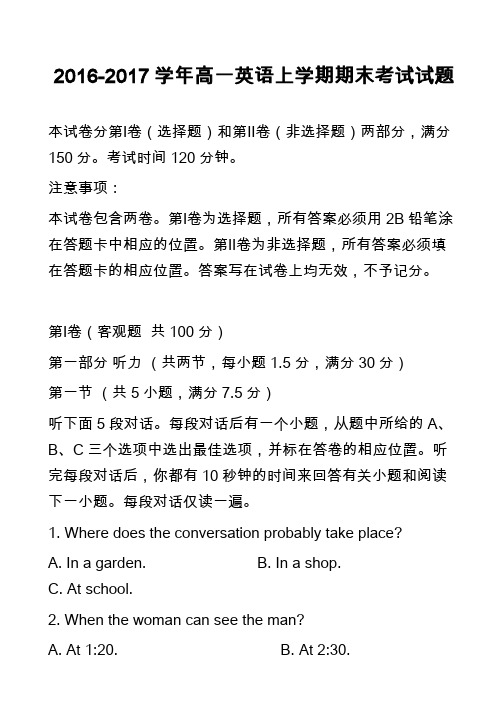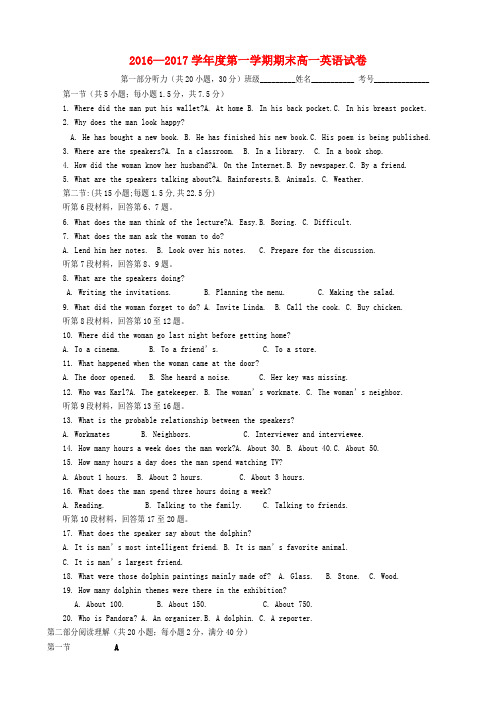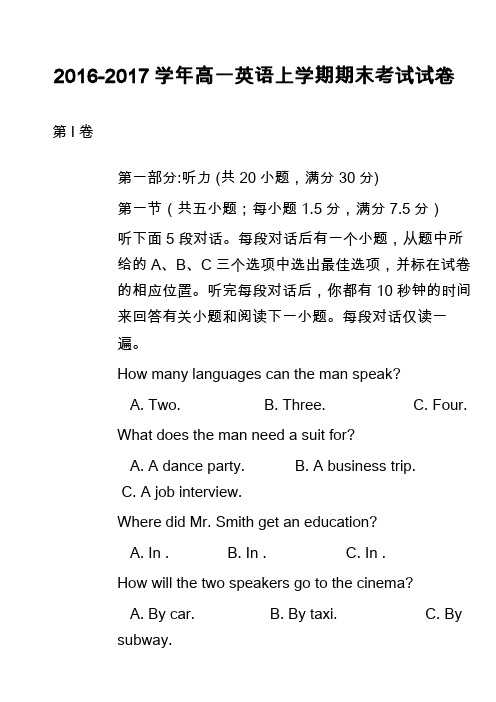2016-2017学年北京市怀柔区高一上学期期末考试英语卷
- 格式:doc
- 大小:353.04 KB
- 文档页数:11

2016-2017学年高一英语上学期期末考试试题本试卷分第Ⅰ卷(选择题)和第Ⅱ卷(非选择题)两部分,满分150分。
考试时间120分钟。
注意事项:本试卷包含两卷。
第Ⅰ卷为选择题,所有答案必须用2B铅笔涂在答题卡中相应的位置。
第Ⅱ卷为非选择题,所有答案必须填在答题卡的相应位置。
答案写在试卷上均无效,不予记分。
第Ⅰ卷(客观题共100分)第一部分听力(共两节,每小题1.5分,满分30分)第一节(共5小题,满分7.5分)听下面5段对话。
每段对话后有一个小题,从题中所给的A、B、C三个选项中选出最佳选项,并标在答卷的相应位置。
听完每段对话后,你都有10秒钟的时间来回答有关小题和阅读下一小题。
每段对话仅读一遍。
1. Where does the conversation probably take place?A. In a garden.B. In a shop.C. At school.2. When the woman can see the man?A. At 1:20.B. At 2:30.C. At 3:40.3. What does the man mean?A. Lucy will go back to China without seeing Richard.B. Richard wants to see Lucy next month.C. Lucy will meet Richard next time.4. What did the woman buy in Paris?A. A beautiful dress.B. A large cloth handb ag.C. A large leather handbag.5. What will the woman do next?A. Lend the man money.B. Find a job for the man.C. Leave the man alone第二节(共15小题;每小题1.5分,满分22.5分)听下面5段对话或独白。

2016-2017-高一上学期期末考试-英语2016—2017学年度上学期期末考试高一英语试卷考试时间:120分钟试题分数:150分第I卷第一部分:听力(满分30分)第一节(共5小题;每小题1.5分,满分7.5分)听下面5段对话。
每段对话后有一个小题,从题中所给的A、B、C三个选项中选出最佳选项,并标在试卷的相应位置。
听完每段对话后,你都有10秒钟的时间来回答有关小题和阅读下一小题。
每段对话仅读一遍。
1. What do we learn about the woman from this conversation?A. She studies at night.B. Her classes aren’t difficult.C. She enjoys teaching herself at home.2. Why didn’t the man get the job?A. Because he was late for the interview.B. Because he had no working experience.C. Because he was not good at writing.3. What did the man buy?A. A new chemistry textbook.B. A used chemistry textbook of the first edition.C. A used chemistry textbook of the third edition.4. What are the two speakers mainly talking about?A. A blouse.B. A clothes store.C. A skirt.5. What is the man probably doing?A. Paying for the breakfast.B. Looking for a job.C. Renting a house.第二节(共15 小题;每小题1.5分,满分22.5分)听下面5段对话或独白。

高中英语学习材料***鼎尚图文理制作***怀柔区2016—2017学年度第一学期期末考试高一英语试卷考试时间120分钟,试卷满分150分第一部分:听力理解:(共三节,20小题,每小题1.5分,满分30分) 第一节(共5 小题;每小题1.5分,满分7.5分)听下面5段对话。
每段对话后有一个小题,从题中所给的A 、B 、C 三个选项中选出最佳选项,并标在试卷的相应位置。
听完每段对话后,你都有10秒钟的时间来回答有关小题和阅读下一小题。
每段对话仅读一遍。
1.Where will Mary probably be at 8 o’clock ?A .At a party. B. At home. C. At her classmate’s house. 2.How many days will the man stay just by himself?A .6B .10C .15 3.How does the woman feel about the fare?A . Cheap.B .OK.C .Expensive. 4.What has the woman decided to do this Friday?A .To go on business.B .To go to the cinema.考生须知 1. 考生务必将答案答在答题卡上,在试卷上作答无效。
2. 答题前考生务必将答题卡上的姓名、准考证号用黑色字迹的签字笔填写。
3. 答题卡上选择题必须用2B 铅笔作答,将选中项涂满涂黑,黑度以盖住框内字母为准,修改时用橡皮擦除干净。
非选择题必须用黑色字迹的签字笔按照题号顺序在各题目的答题区域内作答,未在对应的答题区域内作答或超出答题区域作答的均不得分。
C.To have dinner with her friends.5.What are the speakers mainly talking about?A.A letter. B.A used stamp. C.A used envelope.第二节(共10小题;每小题1.5分,共15分)听下面4段对话或独白。

2016-2017学年高一英语上学期期末试卷(附答案)2016—2017学年度上学期期末考试高一英语试卷考试时间:120分钟试题分数:10分第I卷第一部分:听力(满分30分)第一节(共小题;每小题1分,满分7分)听下面段对话。
每段对话后有一个小题,从题中所给的A、B、三个选项中选出最佳选项,并标在试卷的相应位置。
听完每段对话后,你都有10秒钟的时间回答有关小题和阅读下一小题。
每段对话仅读一遍。
1hat d e learn abut the an fr this nversatin?A She studies at nightB Her lasses aren’t diffiult She ens teahing herself at he2h didn’t the an get the b?ABeause he as late fr the intervie B Beause he had n ring experiene Beause he as nt gd at riting3hat did the an bu?A A ne heistr textbB A used heistr textb f the first editinA used heistr textb f the third editin4 hat are the t speaers ainl taling abut?A A bluseB A lthes stre A sirthat is the an prbabl ding?A Paing fr the breafastB Ling fr a b Renting a huse第二节(共1 小题;每小题1分,满分22分)听下面段对话或独白。
每段对话或独白后有几个小题,从题中所给的A、B、三个选项中选出最佳选项,并标在试卷的相应位置。
听完每段对话或独白前后,你将有时间阅读各个小题,每小题秒钟;听完后,各小题将给出秒钟的作答时间。

2016—2017学年度第一学期期末高一英语试卷第一部分听力(共20小题,30分)班级_________姓名___________ 考号______________ 第一节(共5小题;每小题1.5分,共7.5分)1. Where did the man put his wallet?A. At home B. In his back pocket.C. In his breast pocket.2. Why does the man look happy?A. He has bought a new book.B. He has finished his new book.C. His poem is being published.3. Where are the speakers?A. In a classroom. B. In a library. C. In a book shop.4. How did the woman know her husband?A. On the Internet.B. By newspaper.C. By a friend.5. What are the speakers talking about?A. Rainforests.B. Animals. C. Weather.第二节:(共15小题;每题1.5分,共22.5分)听第6段材料,回答第6、7题。
6. What does the man think of the lecture?A. Easy.B. Boring. C. Difficult.7. What does the man ask the woman to do?A. Lend him her notes.B. Look over his notes.C. Prepare for the discussion.听第7段材料,回答第8、9题。

2016-2017学年高一英语上学期期末考试试卷第I卷第一部分:听力 (共20小题,满分30分)第一节(共五小题;每小题1.5分,满分7.5分)听下面5段对话。
每段对话后有一个小题,从题中所给的A、B、C三个选项中选出最佳选项,并标在试卷的相应位置。
听完每段对话后,你都有10秒钟的时间来回答有关小题和阅读下一小题。
每段对话仅读一遍。
How many languages can the man speak?A. Two.B. Three.C. Four.What does the man need a suit for?A. A dance party.B. A business trip.C. A job interview.Where did Mr. Smith get an education?A. In .B. In .C. In .How will the two speakers go to the cinema?A. By car.B. By taxi.C. Bysubway.What did the man do yesterday?A. He played football.B. He went to see a doctor.C. He took his brother to hospital.(共15小题;每小题1.5分,满分22.5分)听下面5段对话或独白。
每段对话或独白后有几个小题,从题中所给的A、B、C三个选项中选出最佳选项,并标在试卷的相应位置。
听每段对话或独白前,你将有时间阅读各个小题,每小题5秒钟,听完后,每小题将给出5秒钟的作答时间。
每段对话或独白读两遍。
听第6段材料,回答第6、7题。
Why does the woman call the man?A. To tell him a composition.B. To talk about Mr. S mith.C. To ask about homework.What time is it now?A. About 1:30 pm.B. About 2:30 pm.C. About 3:30 pm.听第7段材料,回答第8至10题。
最新2016-2017学年度上学期期末考试高一英语试题(一)考试时间:120分钟试题分数:150分第I卷第一部分:听力(满分30分)略第二部分:阅读理解(共两节,满分40分)第一节(共15小题;每小题2分,满分30分)阅读下列短文,从每题四个选项(A、B、C和D)中,选出最佳选项并在答题卡上将该项涂黑。
ADo you want to get home from work knowing you have made a real difference in someone's life? If yes, don't care about sex or age! Come and join us, then you'll make it!Position: Volunteer Social Care Assistant (No Pay wit h Free Meals)Place: ManchesterHours: Part TimeWe are now looking for volunteers to support people with learning disabilities to live active lives! Only 4 days left. Don't miss the chance of lending your warm hands to help others!Role:You will provide people with learning disabilities with all aspects of their daily lives. You will help them to develop new skills. You will help them to protect their rights and their safety. But you r primary concern is to let them know they are valu ed.Skills and Experience Required:You will have the right values and great listening skills. You will be honest and patient. You will have the ability to drive a car and to communicate in fluent written and spoken English since you'll have to help those people with different learning disabilities. Previous care-related experience will be a great advantage for you.21. The purpose of the text is to ______ .A. leave a noteB. send an invitationC. present a documentD. carry an advertisement22. What does the underlined part in Paragraph 1 mean?A. You'll make others' lives more meaningful with this job.B. You'll arrive home just in time from this job.C. You'll earn a good salary/pay from this job.D. You'll succeed in getting this job.23. The volunteers' primary responsibility is to help people with learning disabilities ______.A. to get some financial supportB. to properly protect themselvesC. to learn some new living skillsD. to realize their own importanceBMy shoe lesson number one.Back in my days as a salesman, I was on my way to deliver a speech in Newfoundland. Sitting comfortably in the airplane seat, I suddenly broke out in a cold sweat as I realized I had left my dress shoes at home. I waswearing running shoes for an important speech.I knew I could buy a new pair when I landed. Too late; the stores were already closed. What about in the morning? No, the next day was Sunday and my speech was scheduled for 9:00 a.m. Ninety seconds later, however, my cold sweat has been replaced with a single idea.The next morning, I began my speech, “You might be wondering why I am wearing running shoes today. Well, it’s about this request here. When I’m done speaking, I’ll be running door to door and I want every one of you to come running with me, too.” My little “goof-up” became a clever demonstration(示范) of action speaking louder than words.My shoe lesson number two.My brother was getting married. We had just witnessed the signing of the papers at their house, and they were rushing over to another place for the ceremony. As we locked up their house, my wife’s shoes broke. So off to the nearest shoe store we flew. We knew they would wait for us before starting the ceremony. What we did not know was how long they would wait.That day, my wife performed a miracle(奇迹)that no other woman had done before or since. She went into the store and came out just five minutes later with the perfect pair of shoes.Perhaps the most important lesson here is that, contrary/opposite to popular belief, the shoe does not make the man/woman. But the lack(缺乏) of shoes can surely build character.24. Upon thinking of his shoes on the plane, the author felt________A. proudB. delightedC. panicky and tenseD. encouraged25. What does the underlined part “goof-up” probably mean?________A. ImageB. MistakeC. SuccessD. Present26. Before entering the shoe store, the author thought it _________A. strange to be in a dilemma/trouble for a second timeB. a great pity to have to mis s his brother’s weddingC. important to test the quality(质量)) of a new pair of shoesD. unlikely for his wife to finish shopping in a short time27. What’s the message the author shows in the text?_________A. Emergencies(紧急情况) can help shape our character.B. You can never judge (判断) a person by his looks.C. It’s hard to change our character overnight.D. Never buy shoes without trying them on first.CWe know the famous ones—the Thomas Edisons and the Alexander Graham Bells —but what about the less famous inventors? What about the people who invented the traffic light and the windshield wiper(雨刮器)?Shouldn’t we know who they are?Joan Mclean thinks so. In fact, Mclean, a professor of physics at Mountain University in Range, feels so strongly about this matter that she’s developed a course on the topic. In addition to learning “who”invented “what”, however, Mclean also likes her students to learn the answers to the“why” and “how” questions.According to Mclean, “When students learn the answers to these questions, they are better prepared to recognize opport unities for inventing and more motivated to give inventing a try.”Her students agree. One young man with a patent(专利) for an unbreakable umbrella is a walking proof of Mclean’s statement. “If I had not heard the story of the windshield wiper’s invention,” said Tommy Lee, a senior physics major,”“I never would have dreamed of turning my bad experience during a rain storm into something so constructive/useful.” Lee is currently considering to sell his patent to an umbrella producer.So, just what is the story behind the windshield wiper? Well, Mary Anderson came up with the idea in 1902 after a visit to New York City. The day was cold and stormy, but Anderson still wanted to see the sights, so she jumped aboard a streetcar. Noticing that the driver was struggling to see through the snow covering the windshield, she found h erself wondering why there couldn’t be a built-in device for cleaning the window. Still wondering about this when she returned home to Birmingham, Alabama, Anderson started drafting out solutions. One of her ideas, a lever(操作杆)on the inside of a vehicle that would control an arm on the outside, became the first windshield wiper.Today we benefit from countless inventions and innovations. It’s hard to imagine driving without Garrett A. Morgan’s traffic light. It’s equally impossible to picture a world wi thout Katherine J. Blodgett’s innovation that makes glass invisible. Can you picture life without clear windows and eyeglasses?28. By mentioning/referring to “traffic light”and “windshield wiper”, the author indicates/shows that countless inventions are .A. bene ficial/helpful, because their inventors are famousB. beneficial, though their inventors are less famousC. not useful, because their inventors are less famousD. not useful, though their inventors are famous29. Professor Joan McLe an’s course aims to_____.A. add color and variety to students’ campus lifeB. inform students of the windshield wiper’s inventionC. carry out the requirements by Mountain UniversityD. prepare students to try their own inventions30. T ommy Lee’s invention of the unbreakable umbrella was _________.A. not eventually accepted by the umbrella producerB. inspired by the story behind the windshield wiperC. due to his dream of being caught in a rainstormD. not related to Professor Joan McL ean’s lectures31. Which of the following can best serve as the title of this passage?A. How to Help Students to Sell Their Inventions to Producers?B. How to Design a Built-in Device for Cleaning the Window?C. Shouldn’t We Know Who Invented the Wi ndshield Wiper?D. Shouldn’t We Develop Invention Courses in Universities?DThe oddness of life in space never quite goes away. Here are some examples.First consider something as simple as sleep. Its position presents its own challenges. The main question is whether you want your arms inside or outside the sleeping bag. If you leave your arms out, they float(漂浮) free in zero gravity(重力), often giving a sleeping astronaut the look of a funny balled (芭蕾)dancer. “I’m an inside guy,” Mike Hopkins says, who returned from a six-month tour on the International Space Station. “I like to be wrapped up.”On the station, the ordinary becomes strange. The exercise bike for the American astronauts has no handlebars. It also has no seat. With no gravity, it’s just as easy to pedal(骑车)v iolently. You can watch a movie while you pedal by floating a microcomputer anywhere you want. But station residents/citizens have to be careful about staying in one place too long. Without gravity to help circulate air, the carbon-dioxide you breathe in has a tendency to form an invisible (隐形的)cloud around your head. You can end up with what astronauts call a carbon-dioxide headache.Leroy Chiao, 54, an American retired astronaut after four flights, describes what happens even before you float out of your seat. “Your inner ear thinks you’re falling. At the same time your eyes are telling you you’re standing straight. That can be annoying—that’s why some people feel sick.” Within a couple days —truly terrible days for some ---- astronauts’ brains learn to ignore the p anicky and nervous signals from the inner ear, and space sickness disappears.Space travel can be so delightful but at the same time invisibly dangerous. For instance, astronauts lose bone mass. That’s why exercise is considered so vital/important that National Aeronautics and Space Administration (NASA) puts it right on the workday schedule. The focus on fitness is as much about science and the future as it is about keeping any individual astronauts healthy. NASA is worried about two things: recovery time once astronauts return home, and, more importantly, how to maintain/keep strength and fitness for the two and a half years or more that it would take to make a round-trip to Mars.32. What is the major challenge to astronauts when they sleep in space?A. Deciding on a proper sleep position.B. Choosing a comfortable sleeping bag.C. Seeking/Looking for a way to fall asleep quickly.D. Finding a right time to go to sleep.33. The astronauts will suffer from a carbon-dioxide headache when _____.A. they circle around on their bikesB. they use microcomputers without a stopC. they exercise in one place for a long timeD. they watch a movie while pedaling34. Some astronauts feel sick on the station during the first few days because _____.A. their senses stop workingB. they have to stand up straightC. they float out of their seats unexpectedlyD. Their brains receive opposite messages35. One of the NASA’s major concerns/worries about astronauts is _____.A. how much exercise they do on the stationB. how they can remain healthy for long in spaceC. whether they can recover after returning homeD. whether they are able to go back to the station第二节(共5小题;每小题2分,满分10分)根据短文内容,从短文后的选项中选出能填入空白处的最佳选项。
2016-2017学年高一英语上学期期末考试试题第一卷第一部分听力(共两节,满分20分)第一节(共5小题;每小题1分,满分5分)听下面5段对话。
每段对话后有一个小题,从题中所给的A、B、C三个选项中选出最佳选项,每段对话仅读一遍。
1. Whose iPad will the woman borrow?A. John’s.B. Adam’s.C. Michael’s.2. What does the man have to do first?A. Clean his room.B. Buy movie tickets.C. Borrow some m oney from his friends.3. Where can the woman find the butter?A. In row10.B. Behind the speakers.C. In the middle of the store.4. What will the woman drink?A. A cup of coffee.B. A glass of water.C. Some orange juic e.5. What does the woman suggest the man do?A. Look at his cards.B. Put his cards down.C. Use different cards.第二节(共15小题;每小题1分,满分15分)听下面5段对话或独白。
每段对话或独白后有几个小题,从题中所给的A、B、C三个选项中选出最佳选项,并标在试卷的相应位置。
每段对话或独白读两遍。
听第6段材料,回答第6、7题。
6. How is Maria related to the girl?A. Her roommate.B. Her classmate.C. Her math teacher.7. What does the man think of Maria?A. She is lazy.B. She is intelligent.C. She isn’t a good pers on.听第7段材料,回答第8、9题。
2016—2017学年度第一学期期末高一英语试卷第一部分听力(共20小题,30分)班级_________ 姓名___________ 考号______________ 第一节(共5小题;每小题1.5分,共7.5分)1. Where did the man put his wallet?A. At home B. In his back pocket.C. In his breast pocket.2. Why does the man look happy?A. He has bought a new book.B. He has finished his new book.C. His poem is being published.3. Where are the speakers?A. In a classroom. B. In a library. C. In a book shop.4. How did the woman know her husband?A. On the Internet.B. By newspaper.C. By a friend.5. What are the speakers talking about?A. Rainforests. B. Animals. C. Weather.第二节:(共15小题; 每题1.5分 ,共22.5分)听第6段材料,回答第6、7题。
6. What does the man think of the lecture?A. Easy. B. Boring. C. Difficult.7. What does the man ask the woman to do?A. Lend him her notes.B. Look over his notes.C. Prepare for the discussion.听第7段材料,回答第8、9题。
2016-2017学年高一英语上学期期末考试试题本试卷分选择题和非选择题两部分,满分150分,考试用时120分钟。
第一卷选择题部分 (满分105分)第一部分听力理解 (共15小题;每小题1分,满分15分)每段播放两遍。
各段后有几个小题,各段播放前每小题有5秒钟的阅题时间。
请根据各段播放内容及其相关小题,在5秒钟内从题中所给的A、B、C项中选出最佳选项,并在答题卡上将该项涂黑。
听第一段对话,回答第1〜3题。
1. Where does the young girl want to go with her father?A. To the park.B. To the movies.C. To the swimming pool.2. Based on the conversation, what time will they most likely l eave?A. 9:30 am.B. 12:45 pm.C. 2:00 p m.3. What does the father suggest they do at the end of the day ?A. Go to a restaurant.B. Watch a fireworks show.C. Play a board game.听第二段独白,回答第4〜6题。
4. What’s the average sleep time for the old?A. 10 hours a night.B. 6. 5 hours a day.C. 6.5 hours a night5. Among the following famous people, who had 413 beds?A. Benjamin Franklin.B. King Louis XIV.C. Mar k Twain.6. What can we learn from the passage?A. Old people need more sleep time than young people.B. It’s easier for famous people to be sleepless.C. Different people have different sleep time.听第三段对话,回答第7〜9题。
2016-2017学年北京市怀柔区高一上学期期末考试英语卷第一部分:听力理解:(共三节,20小题,每小题1.5分,满分30分)第一节(共5 小题;每小题1.5分,满分7.5分)听下面5段对话。
每段对话后有一个小题,从题中所给的A、B、C三个选项中选出最佳选项,并标在试卷的相应位置。
听完每段对话后,你都有10秒钟的时间来回答有关小题和阅读下一小题。
每段对话仅读一遍。
1.Where will Mary probably be at 8 o’clock ?A.At a party. B. At home. C. At her classmate’s house.2.How many days will the man stay just by himself?A.6 B.10 C.153.How does the woman feel about the fare?A.Cheap. B.OK. C.Expensive.4.What has the woman decided to do this Friday?A.To go on business.B.To go to the cinema.C.To have dinner with her friends.5.What are the speakers mainly talking about?A.A letter. B.A used stamp. C.A used envelope.第二节(共10小题;每小题1.5分,共15分)听下面4段对话或独白。
每段对话或独白后有几道小题,从每小题所给的A、B、C三个选项中选出最佳选项。
听每段对话或独白前,你将有5秒钟的时间阅读每小题。
听完后,每小题将给出5秒钟的做答时间。
每段对话或独白你将听两遍。
听第6段材料,回答第6至7题。
6.Where is the man now?A.In a TV studio. B.In Trafalgar Square. C.In a theater.7.How is the weather there?A.Cloudy. B.Windy. C.Good.听第7段材料,回答第8至9题。
8.What does the woman order?A.Orange salad. B.Fried chicken. C.A cheeseburger.9.Under what condition does the restaurant offer discounts (打折)?A.People over 60 spend over $5.B.People over 65 spend over $5 .C.People over 60 spend over $10 .听第8段材料,回答第10至12题。
10.What does the speaker talk about ?A.His hobby. B.His daily work. C.His study.11.Where does the speaker usually read?A.In a study. B.In a coffee shop. C.In his living room.12. Where did the speaker get usual information?A.From books. B. From magazines. C. From newspapers.听第9段材料,回答第13至15题。
13.What’s the relationship between the two speakers?A.Teacher and student. B.Husband and wife. C.Boss and employee. 14.Why is the man upset?A.He didn’t finish the e xtra work.B.He’s tired of the woman’s complaint.C.He had some trouble in working.15.How does the man make the woman happy?A. By inviting her to eat out.B. By buying her a tablecloth.C. By giving her some money.第三节(共5小题;每小题1.5分,共7.5分)听下面一段独白,完成第16至第20题五道小题,每小题仅填写一个词。
听独白前,你将有20秒钟的时间阅读试题。
听完后,你将有60秒钟的作答时间。
这段独白你将听两遍。
第二部分:知识运用(共两节,45分)第一节单项填空(共15小题;每小题1分,共15分)从每题所给的A、B、C、D四个选项中,选出可以填入空白处的最佳选项,并在答题卡上将该项涂黑。
21. My father likes classical music. He ______ to it in his spare time.A. has listenedB. is listeningC. listensD. listened22. In Germany, you ______ arrive lat e to a dinner party. It’s impolite to be late.A. shouldB. shouldn’tC. ought toD. wouldn’t23. The reporter said that the UFO from the east to the west when he saw it.A. was travellingB. travelledC. had been travellingD. was to travel24. The Williams moved to a safer area and since then they ______ back to their past life.A. hadn’t lookedB. didn’t lookC. wouldn’t lookD. haven’t looked25. Every year in April, the Water Festival ______ among the Dai people in Xishuangbanna.A. celebratesB. is celebratingC. is being celebratedD. is celebrated26. Shirley a book about China last year and it sells well now.A. has writtenB. was writtenC. had writtenD. wrote27. According to the air traffic rules, you ______ switch off your mobile phone before boarding.A. ought toB. mayC. canD. would28. He for the first time in his life that night.A. gets drunkB. got drunkC. was drinkingD. is drunk29. —Will you join us in the discussion?—Well, I won’t join you unless Wang Lin too.A. will be askedB. is askedC. askedD. be asked30. I can’t go out now, I _____ look after my baby sister.A. canB. mustn’tC. have toD. needn’t31. How you say that you really understand the whole story if you have coveredonly part of the article?A. mayB. mustC. needD. can32. A new house at the corner of the road and will be completed next month.A. is buildingB. been builtC. is being builtD. be building33. I hope Lily will come to see me before she.A. leaveB. leftC. leavesD. will leave34. Rodger knows her very well. They by an old friend ten years ago.A. were introducedB. introducedC. are introducedD. introduces35. The meeting at half past eight yesterday morning, but he at nine.A. begin; cameB. begun; comesC. begins; comesD. began; came第二节完形填空(共20小题;每小题1.5分,满分30分)阅读下面短文,掌握其大意,从每题所给的A、B、C、D四个选项中,选出最佳选项,并在答题卡上将该项涂黑。
It began a year ago, around Christmas.While driving around the corner of our townhouse sports center, I always noticed an old man sitting by his front yard. He was usually smoking or drinking and looked grumpy (脾气不好).One day, while I was driving past him with my daughter, I decided to 36 at him with a lot of excitement. At the beginning, when he noticed me waving at him, he looked a bit shocked. Then, I saw his 37 go up and he waved back.“38 did you wave at him?” my 39 asked.I told her that it was just an act of kindness that didn’t 40 anything, and it gave both him and me a sense of 41 . She reacted by saying that she was a bit embarrassed(尴尬)to wave to a stranger, 42 next time she would try it as well.Lucky for us, we lived close to the old man, so we 43 him rather often. Whenever we drove by, both of us 44 wave at him and, pretty soon, the old man started waving at 45 who passed by his house.One day, my daughter’s friend came to visit and she told my daug hter that she saw this 46 old man near our home who waved at her very excitedly. She mentioned that she waved back at him, 47 she didn’t know him, and that it felt really 48 .Upon hearing this, my daughter told her friend the story of how all the waving 49 .Her friend said, “Tell your mom that’s really 50 !”Other friends made 51 comments(评价), and this response(反应)taught my daughter just how much an act of kindness can be very natural and effortless, if you really want to 52 it. It 53 us how giving happiness did good to both the giver and the receiver.Moved by all these good effects, we’re planning to give our elder waving neighbor a thank-you card, to express our 54 for the warmth that he communicated through his enthusiastic (热情的)waves. And to thank him for sharing this simple joy 55 all who pass by his house.36. A. look B. laugh C. shout D. wave37. A. leg B. hand C. foot D. head38. A. When B. How C. Why D. Where39. A. son B. daughter C. neighbor D. friend40. A. cost B. bring C. break D. hide41. A. anger B. sadness C. joy D. pride42. A. or B. but C. so D. for43. A. saw B. asked C. thanked D. visited44. A. might B. could C. would D. should45. A. anything B. something C. someone D. everyone46. A. strange B. boring C. relaxing D. peaceful47. A. now that B. so long as C. as if D. even though48. A. important B. dangerous C. good D. safe49. A. began B. succeeded C. remained D. lasted50. A. different B. cool C. easy D. true51. A. no B. bad C. similar D. different52. A. do B. get C. follow D. keep53. A. made B. controlled C. reminded D. showed54. A. opinions B. thanks C. stresses D. willingness55. A. to B. in C. upon D. with第三部分:阅读理解(共15题,每小题2分,共30分)阅读下列短文,从每题所给的A、B、C、D四个选项中,选出最佳选项,并在答题卡上将该项涂黑。